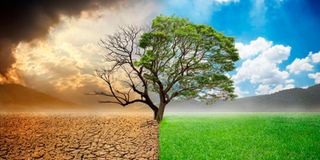Climate change and new gods

The meteorologists say, "maybe by the end of April, some decent rain might begin to fall". It's a scary prospect to imagine that there are another two months of this to go. If there is any upside to this, it has provided great learning about the perils Earth faces.
The nasty weather continues to batter us. Most of Africa is still scorching hot, with livestock being wasted.
Kenya remains in the grip of its sixth rain-poor year, although a few days ago, the skies spat some drizzles in the South Rift and parts of the Nyanza region.
The meteorologists say, "maybe by the end of April, some decent rain might begin to fall". It's a scary prospect to imagine that there are another two months of this to go.
If there is any upside to this, it has provided great learning about the perils Earth faces. I have not taken an Uber ride in recent months where the driver wasn't an expert on climate change.
If this is our future, we need to prepare a lot for it, especially how it will change us as people, which is essentially about changing our culture and politics.
There has been a lot of work and reporting about how climate change could impact current culture and existing cultural assets. Sea level rise and coastal erosion will disrupt traditional boatbuilding and fishing practices, forcing many people to relocate.
Sea levels
We have been warned that in East Africa, many important low-lying coastal heritage sites built on coral or mud, such as Ibo Island in Mozambique, Shanga Island in Kenya and Suakin in Sudan, are particularly vulnerable to rising sea levels and inundation.
Fort Jesus and the white sandy beaches of Mombasa, Malindi, Kwale and Lamu that today attract thousands of tourists could become history and the economy (hotels etc.) that has been built around them.
Apart from historic buildings, archaeological sites and museum collections, and sacred sites, the Tanzanian and Kenyan coasts could see the death of their seasonal festivals. The list is long.
But if these cultural rituals and riches die, new ones will emerge. Those who prepare today for that uncertain future will be the winners.
Right now, Kenya's richest ecological assets that haven't been hit very hard are further in its hinterland in the Lake Region Economic Bloc (LREB) region.
Formed in 2015, it is a domestic economic bloc to enable the 15 counties of Bungoma, Busia, Homa Bay, Kakamega, Kisii, Kisumu, Migori, Nyamira, Siaya, Trans Nzoia, Kericho, Bomet, Nandi and Vihiga achieve economies of scale, better develop and manage cross-boundary economic resources and infrastructure. Most of Kenya's water in a few years will be in LREB.
Large chunks of LREB are in Kenya's "grievance belt", the parts of the country that feel politically excluded because they have never had a president and control of top political assets. Climate change could tilt power considerably in their favour.
Present-day one-man/woman-one-vote politics will not work in an era of climate change. I think we will have an extreme form of exchange politics. If the people of Baringo want water or leases on fertile land in Nyamira to farm, then they will have to deliver all their 500,000 registered voters in 2042 to the presidential candidate chosen by LREB.
Changes
But that will not be the most profound change. For example, polygamy in Kenya and the rest of Africa was largely founded on the control of productive resources (land) and access to markets by men. With land turned to desert, the power will shift to the people who are able to scrap resources from the wasteland and make a living. The people who know how to do that in Africa are women.
Men will increasingly gather around the areas where women have organised these survival resources. In much the same way we see in fishing communities in countries like Uganda where "Fish Mamas" control the trade, we will have a rise of polyandry, with rich female ecological entrepreneurs having a harem of men. It will be the great revenge of history.
The traditional wedding gifts would change dramatically. The really rich men will rock up at their prospective in-law's homes with water bowsers. The chap who shows up with 20 bowsers will be the talk of the county for a year. Cattle and goats would have become simply too expensive and been prized out of dowry culture.
With towns and settlements broken off into oases surrounded by barren lands, we shall enter a new age of the camel in East Africa. The donkey will also become more ubiquitous. Most of these oases will be plied by camels, and we shall all but go back 500 years. In East Africa, however, the age of the camel with also become a new era for the Somali nation. It will be the Somalis who will spread the camel to the climate change-ravaged East African wastelands.
We can also expect the collapse of Christianity (the verdict is still out on Islam). Here we shall also go back 500 years. We will worship river, and tree gods and the spirits that we believe reside in the few waterfalls that will still be around.
A novel written in 2052 will sound like a rip-off of Nigerian author Amos Tutuola's 1952 "The Palm-Wine Drinkard", replete with spirits and gods from the forest and rivers.
Mr Onyango-Obbo is a journalist, writer, and curator of the "Wall of Great Africans". Twitter@cobbo3





